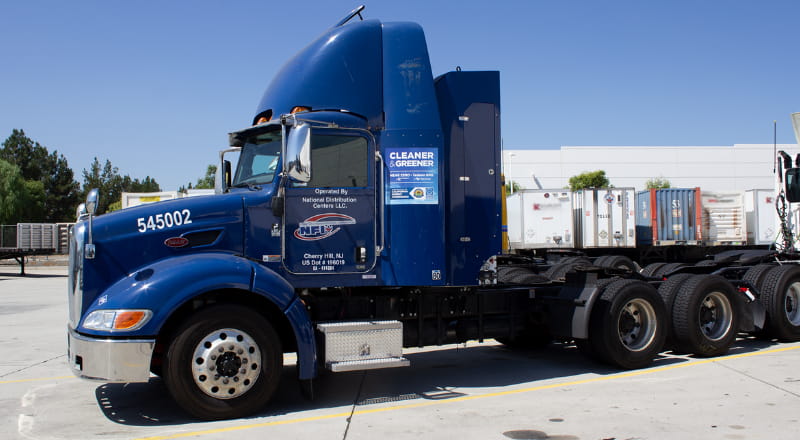When it comes to fleet fuel management, one fleet is doing its part to reduce emissions and protect the environment. NFI Industries, a family-owned logistics provider established in 1932, operates a dedicated transportation and drayage fleet of more than 4,000 heavy-duty tractors across North America. Today, NFI’s fleet includes vehicles that leverage electricity, compressed natural gas, clean diesel, and near-zero emission vehicles that run on renewable natural gas.
Alternative fueling
“We feel that investing in alternative fueling, like electric and natural gas, aligns with our core value to be a more sustainable fleet, and the timing is right for us to be using green technology,” said NFI Vice President of Fleet Services Jim O’Leary, who oversees fuel procurement, telematics and special projects at NFI.
An early adopter of alternative fueling, NFI began investing in natural gas vehicles nearly a decade ago. “Because we have so many applications that can benefit from alternative fueling technology, we felt that we had to be on the cutting edge of sustainable fuel management,” said O’Leary.
The Tesla effect
As electric trucks enter the market, however, the number of natural gas vehicles in NFI’s fleet has decreased over the last few years. “It’s simply not what manufacturers are focusing on,” according to O’Leary. “I call it the Tesla effect.
Tesla brought attention to electric vehicles. While natural gas technology is available, it’s not getting the attention that electric is. The conversation has changed in the last few years.”
Later this year, NFI will take its alternative fuel efforts a step further when it demos 10 Daimler Class 8 all-electric vehicles in its drayage operations in California. NFI is one of only two fleets that Daimler has partnered with to pilot their first all-electric Class 8 vehicles. Because electric trucks can operate 150 to 200 miles before they need to charge, NFI had the perfect use case for the technology at its California drayage operations.
“When you look at trucking, the 150- to 200-mile limit isn’t going to work for a lot of applications, but with our presence in the Ports of Los Angeles and Long Beach, it made sense for NFI and Daimler to partner in this initiative,” said O’Leary. “We have a perfect use case; the ports want clean trucks, our application would be 100-mile round trips, and we pride ourselves on having a sustainable, cutting edge fleet. It should be a great marriage.”
Additional measures for reducing fleet fuel consumption
NFI takes other measures to reduce its fuel consumption in addition to investing in alternative fuel vehicles. For example, it governs its trucks to 65 mph on cruise and 63 on the pedal and limits drivers’ idling times.
“If you’re not limiting the speed of your tractors, then you have no interest in being a green fleet or trying to increase your miles per gallon,” O’Leary said. “It’s one of the easiest ways for companies to conserve fuel. NFI uses telematics to create dashboards, scorecards, and other key performance indicators to optimize performance.
To supplement its fuel management efforts, the company uses wide-based tires that reduce friction on the road, getting more miles per gallon and further lowering its fuel consumption. Additionally, All NFI sleeper trucks have battery-powered auxiliary power units (APU), so when a truck is idling, it can switch over to the battery-powered APU instead of using diesel. NFI also puts air tabs on its trailers and tractors that are designed to reduce resistance and cut through air more efficiently.
"We’re constantly looking into alternative technologies to increase MPG and reduce our carbon footprint...NFI also coaches its drivers on idle time, hard accelerations, and other gas-guzzling behaviors."
The miles per gallon in NFI’s fleet has continued to increase since investing in alternative fuel vehicles and other fuel consumption reducing technologies. These alternative fuel technologies have also helped cut NFI’s overall emissions and propelled the company to earn the Environmental Protection Agency (EPA) Smartway Excellence award four times in the last 13 years.
The future of alternative fueling for NFI
NFI plans to continue growing its fleet of alternative fuel vehicles, as well as enhancing fuel management initiatives. “We expect to expand our fleets of electric and zero-emission natural gas vehicles by the beginning of next year,” said O’Leary. “I believe we’ll be one of the only fleets in the country to be able to lay claim to that. It’s very exciting and we look forward to continuing to identify new and innovative ways to create an even more sustainable operation for both NFI and our customers.”
Did you know that managing fuel consumption can also help improve your bottom line? Here are 4 things your drivers can start doing right now to help you reduce fuel costs.
